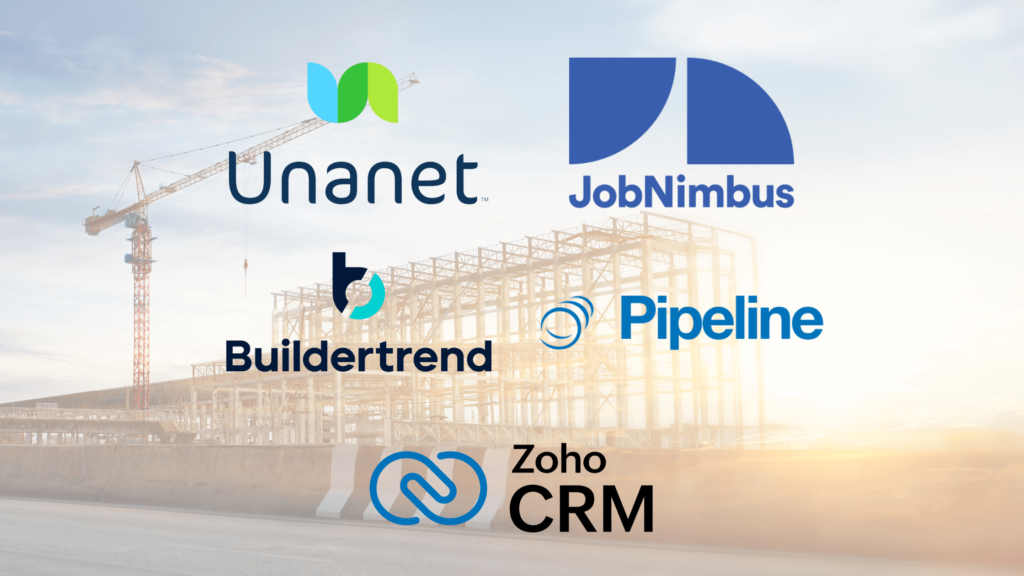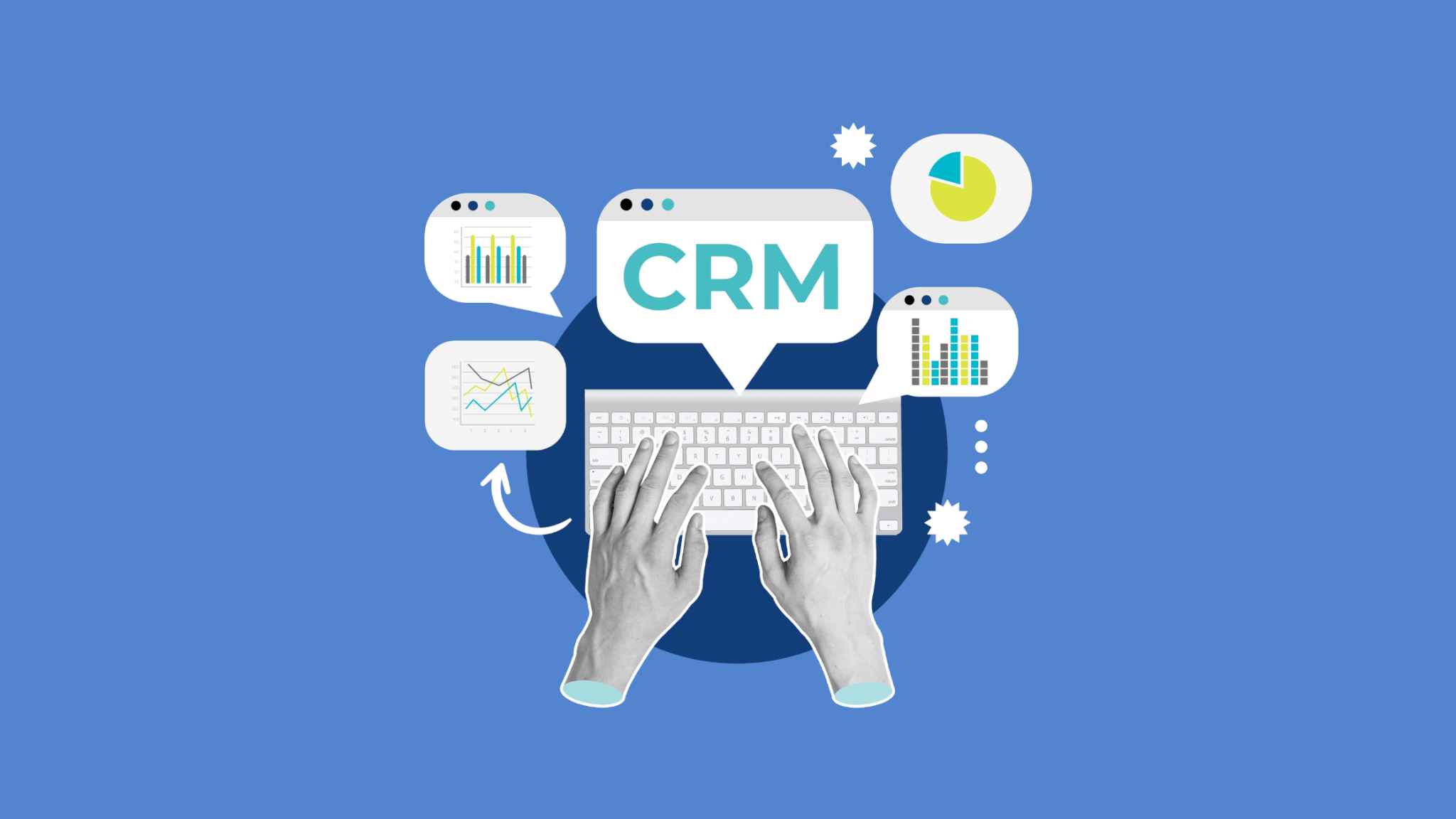Construction companies are constantly faced with challenges such as fragmented communication between trades, organizing project details, and managing client relationships. CRM (Customer Relationship Management) software helps solve these problems by keeping all client and project information in one place. Choosing the right CRM software for your construction business is where things can get a little more complicated. With so many CRM tools available, knowing which one to pick is hard. Unanet CRM and JobNimbus are great options, but understanding the benefits of using a CRM for your construction company will help you choose the right platform.
Quick look
- A CRM helps construction companies streamline communication, organize project details, and manage client relationships, all in one place.
- With the right CRM, you can track leads, sales, and project progress, which can lead to more efficient operations.
- Key features include mobile accessibility, project management tools, document storage, and integration with other software.
- Using CRM software helps construction teams to collaborate better, reduce errors, and ensure projects stay on schedule.
- Choosing the right CRM will depend on your business needs, ease of use, scalability, and support options.
What is the purpose of a CRM?

A CRM, or Customer Relationship Management system, is a tool that helps construction businesses manage their relationships with customers. It stores information like contact details, past interactions, and project data in one place. It also tracks leads and sales opportunities, making it easier to follow up and secure new business. Centralizing communication and information makes it easier for companies to build and maintain strong customer relationships. But that’s just one of the many benefits of using a CRM.
The 11 benefits of using a CRM tool in construction
- Improved communication: A CRM centralizes all client and project communication, ensuring everyone on the team can access the same up-to-date information. This reduces miscommunication and helps avoid costly mistakes.
- Better lead and sales tracking: Construction companies can track potential clients and follow up on sales opportunities with a CRM. This improves lead conversion rates and helps grow the business.
- Enhanced reporting and insights: CRMs provide detailed reports and analytics, helping construction companies track performance, identify trends, and make data-driven decisions to improve their business.
- Real-time data accessibility: CRMs give teams real-time access to project updates, client information, and communication records from any location. This is particularly helpful for construction teams working on-site or across multiple locations.
- Improved efficiency: A CRM frees up time for teams to focus on high-value activities by automating repetitive tasks, like scheduling follow-ups or sending reminders. It also reduces errors by organizing all information in one system.
- Enhanced team collaboration: With centralized data, all departments—sales, project management, and customer service—can work together effortlessly. This keeps everyone aligned and informed about client needs and project statuses.
- Scalability for growth: As businesses grow, a CRM can handle increasing amounts of data, clients, and projects. This keeps the company organized and efficient, even as operations expand.
- Better resource allocation: CRMs integrate with project management tools to help effectively assign resources, track equipment usage, and schedule labor. This ensures projects are completed on time and within budget.
- Improved project management: CRM software can integrate with project management tools, helping construction companies manage timelines, budgets, resources, and documentation, keeping projects on track and within scope for successful delivery.
- Mobile-friendly: CRMs allow construction teams to access client information, project updates, and schedules from anywhere using their mobile devices. This is especially useful for field workers and on-site teams, who can stay connected and update records in real-time.
- Enhanced marketing campaigns: Construction companies can create more targeted and effective marketing campaigns with detailed client data stored in a CRM.
Key features of a CRM for construction
Whether you’re part of a small construction business, a general contractor, or a large construction company, a CRM has several features to look for that can improve your business’s efficiency and client relationships. Here are some key features to consider and why they should be included in your system:
- Project management tools: Project management features in a CRM allow you to track project timelines, assign tasks, and monitor progress. This ensures that every project stays on schedule and within budget, helping you meet deadlines and satisfy clients.
- Lead and sales management: CRM tools that track potential clients and automate follow-ups make managing leads and sales opportunities easier. These tools help your sales team convert more leads into actual projects, increasing revenue and boosting business growth.
- Document management: Centralizing important documents like contracts, blueprints, and permits in a CRM makes them easily accessible to the team. This feature reduces the risk of misplaced files and ensures you always have the latest project information at your fingertips.
- Client communication logs: A CRM stores all client communication, including emails, calls, and meetings. This creates a complete history of interactions, which helps provide personalized service, resolve issues faster, and strengthen client relationships.
- Mobile accessibility: With mobile access, your team can update information or access client details directly from job sites. This flexibility allows for real-time data entry and better communication, keeping everyone in the loop regardless of location.
- Integration capabilities: CRMs can integrate with other software tools you already use, such as accounting or project management systems. This reduces manual data entry and creates a more streamlined workflow, improving efficiency across departments.
- Reporting and analytics: Built-in reporting and analytics features provide insights into sales performance, project progress, and client trends. This data allows you to make informed decisions, adjust strategies, and identify areas for improvement in your business.
- Customization options: A CRM that can be customized to fit the unique needs of your construction business allows you to tailor workflows and features. This ensures the system works best for your operations, making it more effective and user-friendly for your team.
How to choose the right CRM software for your company
Choosing the right CRM software for your construction company can greatly affect how efficiently you manage projects, clients, and day-to-day operations. With so many options available, it’s important to know what to consider when selecting a CRM:
1. Understand your business needs
Before looking at CRM software, take some time to evaluate your company’s specific needs. Think about your goals—improving communication with clients, tracking project timelines, or managing leads—and prioritize the best features to help you meet those goals. Knowing what problems you want to solve enables you to narrow down your options.
2. User-friendly interface
The best CRM for your company should be easy for everyone on your team, whether in the office or working on-site. Look for a system that’s intuitive and doesn’t require a lot of training. If the software is complicated or hard to navigate, your team may resist using it, limiting its effectiveness.
3. Integration with existing tools
A CRM that integrates easily with other tools and software you already use can save you time and effort. For example, if you’re already using accounting software or a project management tool, it’s important that your CRM can sync with these systems to keep everything in one place and reduce manual data entry.
4. Scalability
As your business grows, your CRM should be able to grow with you. Look for a scalable CRM that can handle increased data, more clients, and additional team members without slowing down or costing you more. A scalable CRM helps you avoid the need to switch systems as your company expands.
5. Customer support and training
Choosing a CRM with excellent customer support is important, especially if you’re new to CRM software. Ensure that the software provider offers training materials, support teams, and resources to help you get the most out of the system. Fast, reliable support can help resolve any issues quickly and avoid disruptions to your operations.
6. Budget and pricing structure
The cost of CRM software can vary greatly depending on the features and size of your company. Ensure you understand the pricing structure and that it fits within your budget. Many CRM providers offer tiered pricing based on features, so start with the plan that meets your needs and upgrade as necessary.
By considering these factors, you can choose a CRM that will support your future growth. Take your time, test different options, and select the one that will best fit your company’s needs.
5 best construction CRMs for general contractors

Unanet CRM by Cosential
Unanet CRM provides project-based ERP and CRM solutions designed specifically for government contractors, AEC firms, and professional contracting services. Over 4,000 project-driven organizations rely on Unanet, which offers marketing, business development, and project management features essential for managing large-scale construction projects and staying compliant with regulations. These include proposal generation and pipeline management to help you manage and win proposals.
JobNimbus
JobNimbus markets itself as “the best-in-class CRM for roofing contractors” and is trusted by over 4,000 roofing companies. While it caters to roofing, its features can be used by various contractors in the construction field. These include project management tools, document storage, and mobile access. The CRM makes communication and organization simple, ensuring construction companies can keep track of every project detail from start to finish.
Buildertrend
Buildertrend is a comprehensive construction management software designed to streamline project management, communication, and financial tracking. It includes CRM tools to help track leads, manage client communication, and integrate project details in one platform. With features like scheduling, budgeting, and document sharing, Buildertrend makes it easy for construction companies to stay organized and connected with clients and teams.
Pipeline CRM
Pipeline CRM is designed specifically for construction companies, offering features that help streamline operations and improve client relationships. It allows users to customize deal stages to match their sales process, store important project documents in one place, and access the CRM from mobile devices for on-the-go management. With email integration, automated alerts, and geolocation features for route planning, Pipeline CRM helps construction teams stay organized and efficient while enhancing communication and collaboration. This CRM is a great option for businesses looking to optimize their sales process and project management.
Zoho CRM
Zoho CRM offers features like field sales tracking, allowing construction companies to monitor deals, store contacts, manage files, and track lead activity. It includes an account management system that ensures timely payments for retainer projects. The software also integrates inventory management, making it easy to generate quotes and schedule jobs in one place, streamlining operations.
Bottom line
Choosing the right CRM for your construction company can make a huge difference in how efficiently you manage projects, clients, and internal operations. By selecting software that aligns with your business goals and industry needs, you can streamline workflows, improve client relationships, and set your company up for long-term success.
Want more insights on how to improve your construction business? Subscribe to our newsletter and follow us on social media for the latest tips, tools, and trends in the industry!
About the author
Alexander Klocek is Content Director at Under the Hard Hat, a media platform focused on the construction workforce. Before managing the publication, he built a career as a content writer and copywriter, producing articles, scripts, and marketing content across health & fitness, finance, and SaaS before transitioning to media for the architecture, engineering, and construction industry.



1 comment